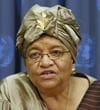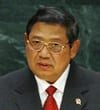Posts by Hlp Adm
H.E. Ms. Ellen Johnson Sirleaf, President of Liberia
Co-Chair Ms. Sirleaf is the first elected female head of state in Africa and has been in office since 16 January 2006. She won a second term in 2011. President Sirleaf was jointly awarded the 2011 Nobel Peace Prize with Leymah Gbowee of Liberia and Tawakel Karman of Yemen (also on the High Level Panel).…
Read MoreH.E. Mr. Susilo Bambang Yudhoyono, President of Indonesia
Co-Chair Dr. Susilo Bambang Yudhoyono is the sixth President of the Republic of Indonesia, and also the country’s first directly elected President. President Yudhoyono has assumed a number of self-transformation: from student to soldier, soldier to reformist general, four-star general to Cabinet Minister, Minister to Politician, and politician to President. President Yudhoyono has an extensive…
Read MoreBriefing of the President of Indonesia to the General Assembly
BRIEFING BY H.E. DR. SUSILO BAMBANG YUDHOYONO PRESIDENT OF THE REPUBLIC OF INDONESIA TO THE UN GENERAL ASSEMBLY ON THE REPORT OF THE UN HIGH-LEVEL PANEL OF EMINENT PERSONS ON THE POST-2015 DEVELOPMENT AGENDA 30 MAY 2013 Mr. President, Mr. Secretary-General, Excellencies, Distinguished Delegates, Ladies and Gentlemen, I thank you for the invitation to brief…
Read MoreHigh Level Panel Releases Recommendations For World’s Next Development Agenda
Eminent Persons from Around the World Call for a New Global Partnership to Eradicate Poverty and Transform Economies through Sustainable Development The High Level Panel on the Post-2015 Development Agenda today released “A New Global Partnership: Eradicate Poverty and Transform Economies through Sustainable Development,” a report which sets out a universal agenda to eradicate extreme…
Read More2. Put Sustainable Development at the Core
For twenty years, the international community has aspired to integrate the social, economic, and environmental dimensions of sustainability, but no country has yet achieved patterns of consumption and production that could sustain global prosperity in the coming decades. A new agenda will need to set out the core elements of sustainable lifestyles that can work…
Read More5. Forge a new Global Partnership
A fifth, but perhaps most important, transformative shift for the post-2015 agenda is to bring a new sense of global partnership into national and international politics. This must provide a fresh vision and framework, based on our common humanity and the principles established at Rio. Included among those principles: universality, equity, sustainability, solidarity, human rights,…
Read MoreTransformative shift leave no one behind
The next development agenda must ensure that in the future neither income nor gender, nor ethnicity, nor disability, nor geography, will determine whether people live or die, whether a mother can give birth safely, or whether her child has a fair chance in life. We must keep faith with the promise of the MDGs and…
Read MoreCHAPTER 2: FROM VISION TO ACTION—PRIORITY TRANSFORMATIONS FOR A POST-2015 AGENDA
Five Transformative Shifts The Panel views five big, transformative shifts as the priorities for a forward-looking, compelling and integrated sustainable development agenda based on the Rio principles. The first four shifts are where the focus for action is mostly at the country level, while the fifth transformative shift, forging a new global partnership, is an…
Read MoreCHAPTER 4: IMPLEMENTATION, ACCOUNTABILITY AND BUILDING CONSENSUS
Implementing the Post-2015 Agenda The illustrative goals and targets we have set out are bold, yet practical. Like the MDGs, they would not be legally binding, but must be monitored closely. The indicators that track them should be broken down in many different ways to ensure no one is left behind. We recommend that any…
Read MoreCHAPTER 3: ILLUSTRATIVE GOALS AND GLOBAL IMPACT
The Shape of the Post-2015 Agenda Bold commitments in these five areas – leave no one behind, put sustainable development at the core, transform economies, build peace and effective and accountable institutions, and forge a new global partnership – would allow the international community to keep the promises made under the MDGs, raise the bar…
Read More



